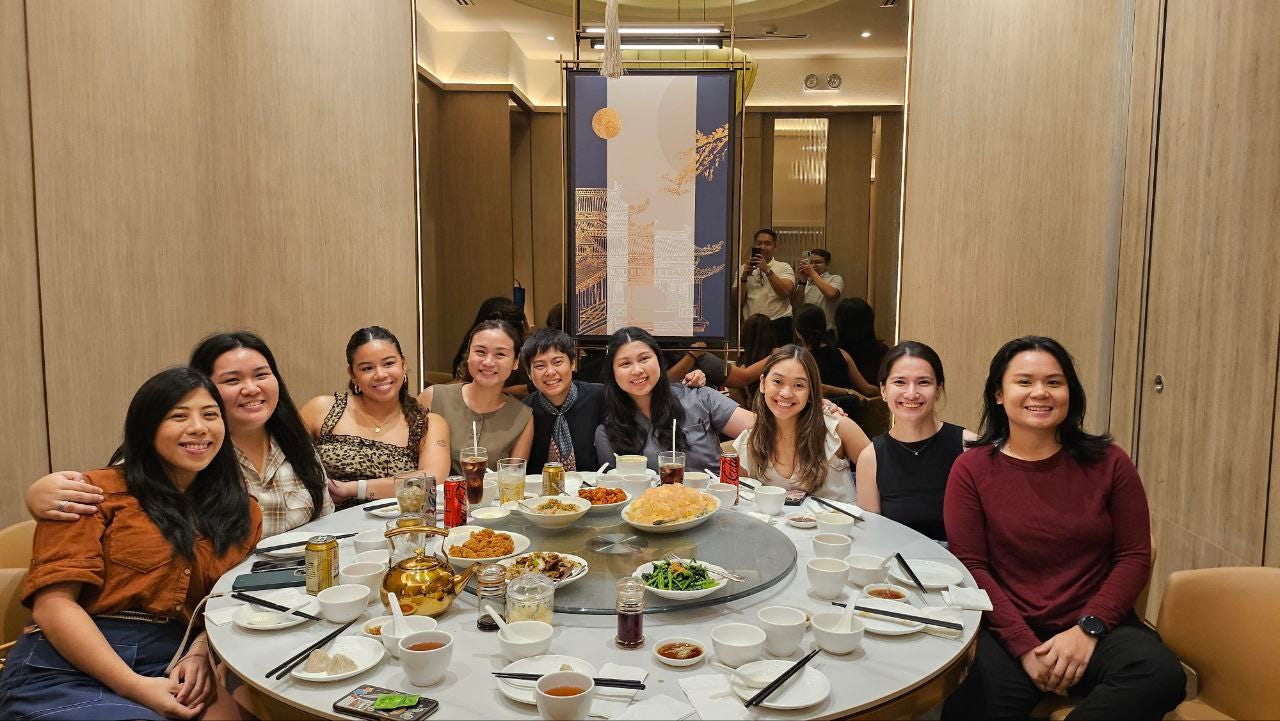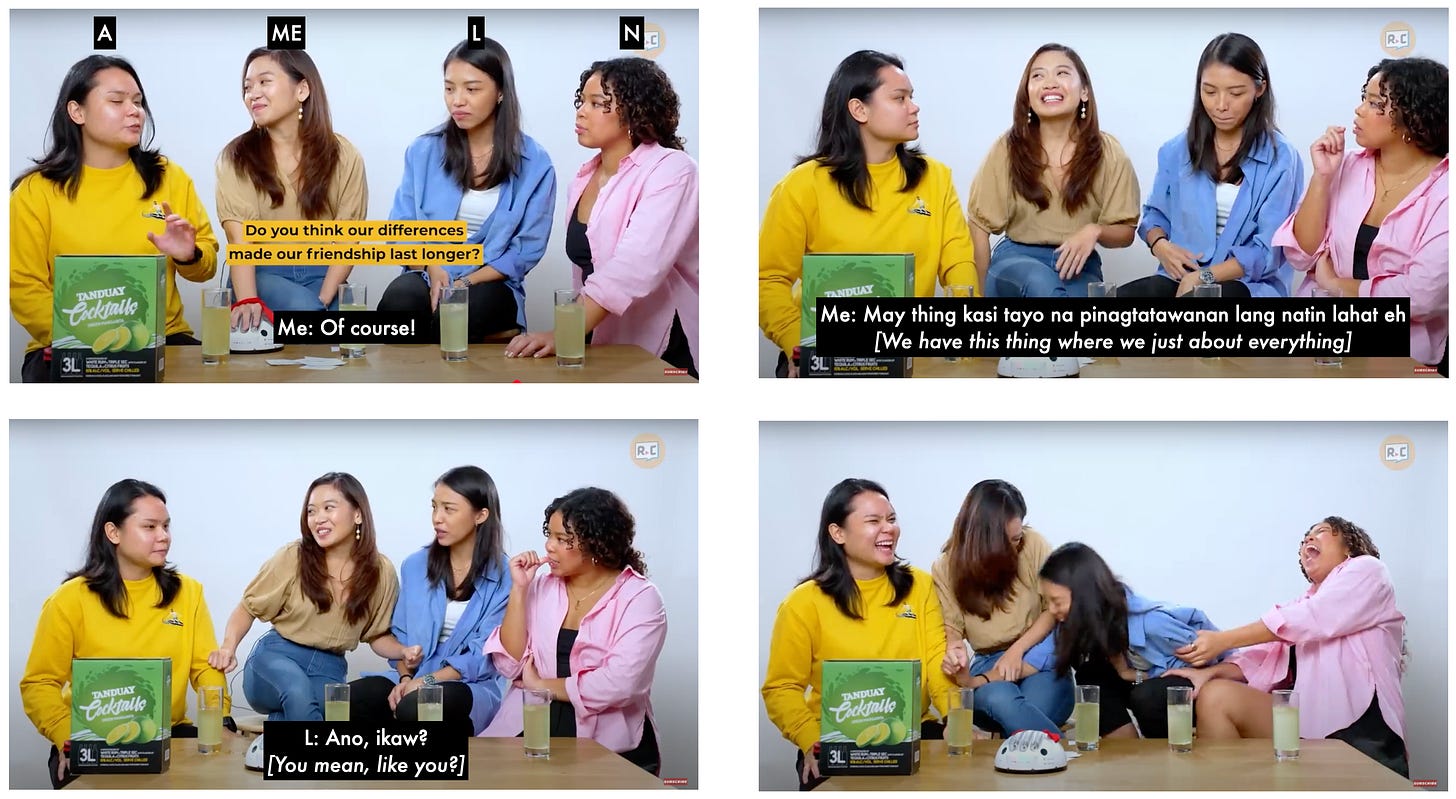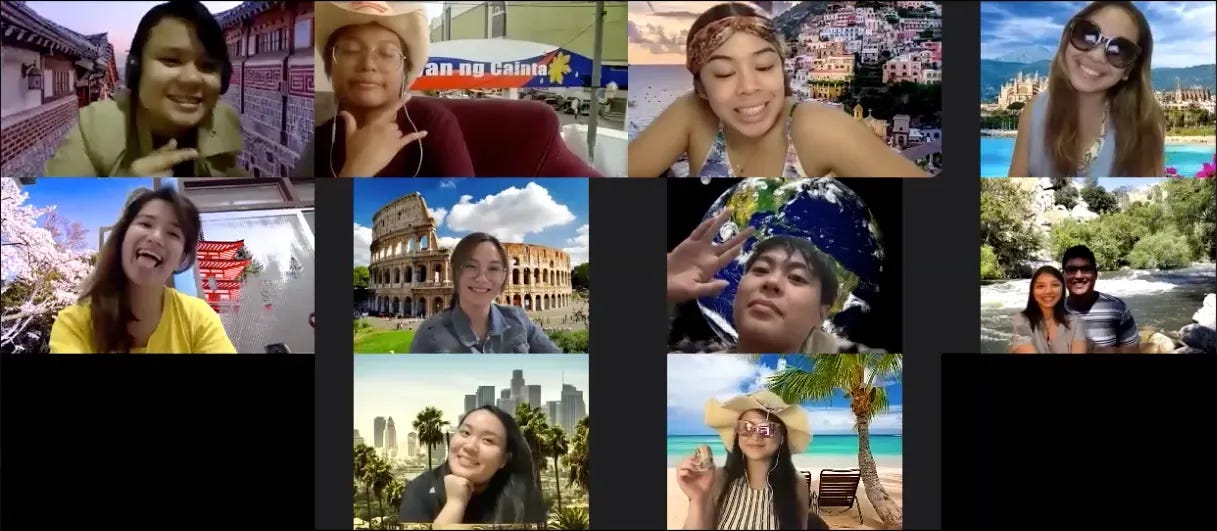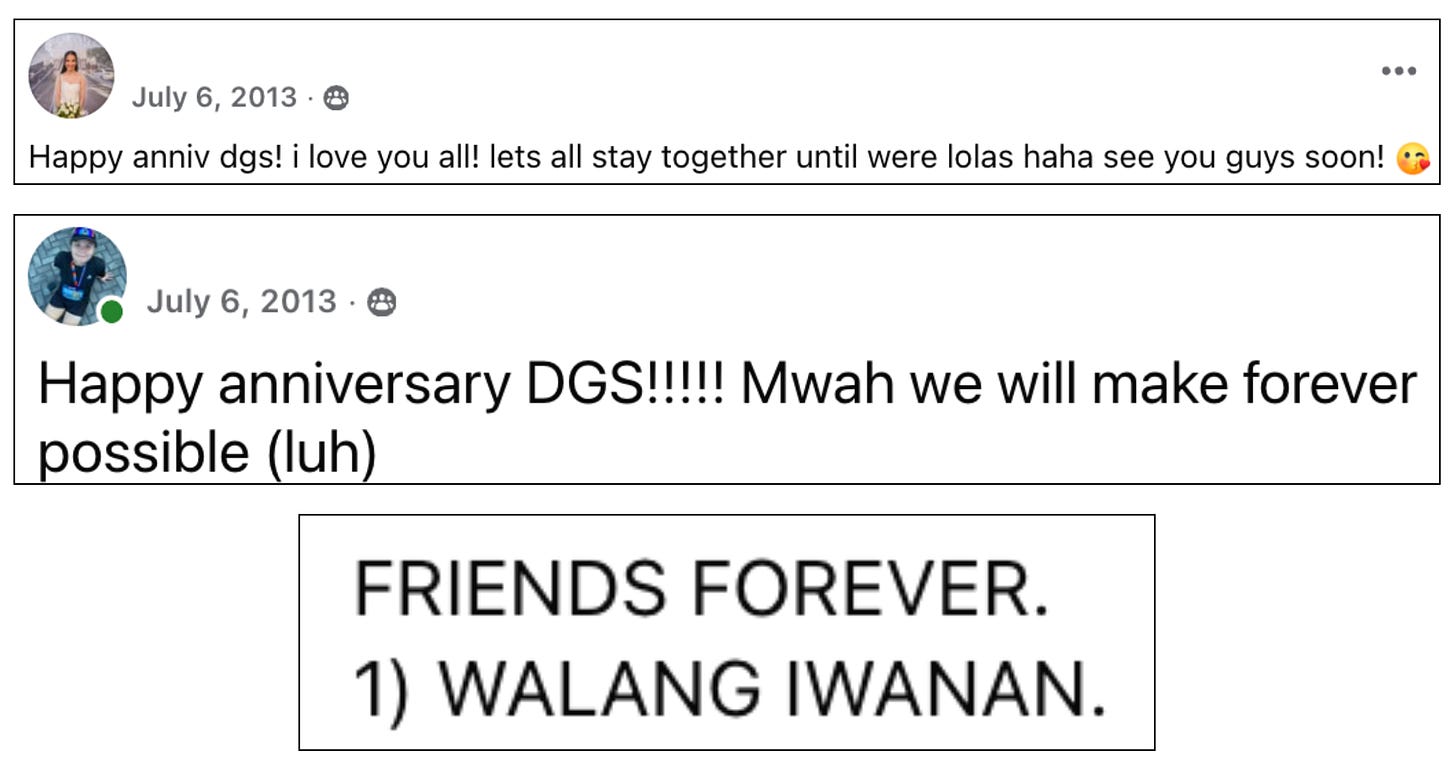#49 Lessons from my 18-Year Relationship
The indispensable love language of staying power
Hello!
Before anything, since I mentioned in my last newsletter that I used AI for dating advice, I now feel the need to reassure you that I do not use AI for my writing. My work is and will always be 100% human-generated.
Hope you enjoy my August newsletter!
It was all such stupid luck, really — to have met each other so young, so unburdened, so in sync and within proximity. That was in seventh grade. One afternoon, we found each other gallivanting around campus, waiting for our respective rides to pick us up. I can no longer remember what we did to kill time, and I could say the same thing about the entirety of the relationship: you enjoy each other’s company so much and the next thing you know eighteen years has passed you by.
In hindsight, I’d consider millennialhood a stroke of luck, too. As 90s babies, our relationship was born, bred, and built largely offline. And while we’re nostalgic for the simpler days of dial-up connection, CDs, and the shameless “BUZZ!!!” of Yahoo! Messenger, I doubt our relationship would’ve come of age with us had our portals of communication stayed in that era. Today, we share our locations in real time! We greet each other with good morning videos! We send stickers made out of our own annoying faces!
We’ve met each other’s families, slept in each other’s beds, traveled together. We’ve navigated the distance of attending separate universities, held each other’s hands amidst our own quarter-life crises, and survived nearly two years of zero physical contact. (Covid was, say, an extended experience here in the Philippines).
In July, we celebrated our 18th anniversary.
I’m so proud to introduce my rock, my roots, my rocket fuel:

I’ve always loved how we made our friendship anniversary a thing. But it didn’t occur to me until recently that our longevity — Eighteen years! A debutante! — is actually quite a feat.
I suspect the oversight is partly conditioning. We designate anniversaries to couples much like how the word “soulmate” is reserved for the love of your life. As someone raised by 2000s romcoms, I get it. I, too, have once fallen for the propaganda that finding a man is the most life-defining, soul-shattering, heart-expanding thing that you can — and must — have in your life.
Besides, platonic relationships are just… boring. With friends, there’s no chase, not many stakes, no establishment of commitment. And yet, there they stay, right by your side, no matter how busy you get or how often your childhood traumas leak into your choices or how many times you keep letting that shitty ex back into your life. It’s the same old people holding your hand. As it naturally does, the hedonic treadmill rears its ugly head, numbing us to the specialness of what’s always been there.
But it could also be cultural: As strong collectivists, the urge to preserve relationships comes naturally to us Filipinos. The fact that we have a word for “group of friends”, barkada, and that it isn’t uncommon for us to assign a name to our barkada as if it were some cult or organization, speaks to how integral our friendships are to our sense of identity. How we may sometimes overcommit to our collectivism at the cost of our own peace, potential, and progress is another question, but at least for this case, what I can say with conviction is this: keeping this friendship alive and kicking has been one of the most rewarding privileges of my life. Our friendship, I see clearly now, has staved off loneliness, sheltered my safe space, and given me a personality. It’s a life force that’s been both steadying and transformative. Most crucially, it now serves as one of my richest sources of material for writing.
Kidding aside, in writing this piece I thought a lot about Dolly Alderton’s book Everything I Know About Love, which — spoiler alert — is actually not mainly about romantic relationships, but friendship. “Nearly everything I know about love,” Dolly wrote, “I've learnt from my long-term friendships with women.”
See, my last and longest romantic relationship endured for three and a half years. That was a decade ago. Everything I know about building and sustaining a solid connection, about commitment and staying power (I love this term), I’ve learned from my barkada. And while I know that friendships and romantic relationships aren’t an apples-to-apples scenario (none of us have to go to bed with and wake up to each other’s quirks and less domesticated habits), I do believe there is one internet maxim that applies to both: “If you take care of things, they last.”
This is how we’ve taken care of our barkada.
People who laugh together last forever
When we were about to graduate from grade school, our barkada had a rift over the kind of graduation party we wanted to throw.
One camp wanted the grown-up kind: an open party with booze, loud music, lights, a dance floor, boys! Being the cool kids that we were, we called our party “Radar”. The other camp wanted something more casual. An afternoon affair, real meals, games — a celebration where our batchmates could actually bond and hear each other. And what did they name their party?
“Cheddar”.
Today I fondly recall that moment as a shining example of how we approach most things, including our disagreements: always with a sense of humor.
In our heartbreak and humiliation, our mistakes and misfortunes, our flaws and foibles, there’s always someone amongst us who will manage to inject some levity, wit, or sass and take the edge off things. It was my friends who taught me the power of poking fun at life, at ourselves, at each other; it’s not just about self-enjoyment, but the ability to diffuse tensions and fears and constantly bring joy to each other's lives.

In the end, through all the teasing, the legitimate squabbles, the annoyances we let slip, and the offenses unintentionally committed, our ability to find the laughter in all of it has helped us maintain that these things don’t have to have that much power over our relationship. And so while people may say laughter is the best medicine, I’d say that, for relationships, it might be the best adhesive.
Quality time: the indispensable love language
One of my friends posed that, though we all have our individual love languages, our barkada’s platonic love language is one and the same: quality time. I wonder if this has been our secret all along.
One reason a relationship starts to feel unsatisfying, despite having a long, happy history, is that its participants have ceased to pay attention to each other. That’s why quality time is so valuable: it’s the time you spend giving another person your undivided attention.
But what if there was another way to enjoy quality time? What if instead of paying attention to each other, you pay attention with each other? What if you looked to thoses moments where, to paraphrase the poet Donald Hall, your gazes met and entwined as you looked at a “third thing”?
“Third Things are essential to marriages,” Hall wrote, “objects or practices or habits or arts or institutions or games or human beings that provide a site of joint rapture or contentment. Each member of a couple is separate; the two come together in double attention.”
People in relationships can share a variety of Third Things. But our barkada’s first Third Thing?
Drinking.
For the better part of our friendship, we drank. To celebrate, to escape our broken hearts. We also drank for no other reason than to be with each other. We caroused for wilder nights, yes, but we drank for deeper ones, too. Either way, we learned early on that we could be our most honest, unguarded, and — on occasion — wasted selves around each other. If that isn’t trust-building, I don’t know what is.
Now that we’re older, alcohol is no longer a prominent feature of our time together, not when a bottle of beer cancels out the five kilometers we logged on Strava. The late nights and shots have given way to new forms of quality time: early morning runs, brunches, dinners that don’t go past 9 PM, and baby milestones.
And here’s what I realized while writing this: our Third Thing isn’t alcohol or any one activity, but fun. Our fundamental Third Thing is play. I suspect this is why it has never felt like we had to actively tend to our relationship, like we have to go out of our way for quality time — it’s hardly maintenance if you’re having so much fun.
The underrated power of traditions
A simple thing that’s sustained our friendship is our traditions.
We have two: our friendship anniversary and Christmas. Which might not seem to matter much because that’s only two days out of the calendar year. But traditions are powerful not because of frequency, but because they stubbornly exist.
Traditions strengthen relationships because they give people a chance to identify with something bigger than themselves — and to remember why it’s worth being part of. Creating a tradition bestows sacredness on the object of the tradition. And to honor that tradition is to renew your commitment to it. It says: “This is important to me. I belong here. I have faith in this. And I still want to be here.”
Growing on our own, together
Meeting each other practically as kids, we’ve seen and experienced each other’s weaknesses and insecurities at their most pronounced. Did we know if we were eventually going to overcome them? No. Did we have utter faith in each other’s capacity to grow? Maybe. Did we simply tolerate each other? For sure.
But perhaps that’s part of it. As Robert Downey Jr. put it: “Friendship means loving tolerance.” Maybe there’s something in just letting each other be.
When our barkada went to different universities, our lives diverged. We hung out when there was reason to hang out — a birthday or a post-breakup debrief — but we spent most of our college years as separate individuals, in separate parts of the metro, with separate college barkadas.
And in the process of living our own lives, something happened under our noses: we all grew. We grew at our own pace, saw things when we were finally ready to see them, and let life teach us what we needed to learn in the way we needed to learn it.
Today, we get to be adults who are far from perfect but also far from who we used to be. We get to be in the company of better, wiser versions of each other, because of loving tolerance — and because we stuck around as we all found our own way.
The interplay between grace and effort
Mindful of survivor bias, I thought it was worth asking: Why aren’t the people who used to be in the group, no longer here? Why did they fall out?
Some made drastic life choices that required them to focus all their energy on acclimatizing and rebuilding their lives. With others, an issue arose that fractured the friendship, and they never managed to reconcile. Either way, a gap began to emerge between people and, left unattended, the chasm grew on its own.
But as you shove yourself deeper into adulthood, you realize that gaps exist simply because you all need to keep up with your starkly different lives. One of us is preparing for her second daughter’s first birthday, while someone else is training for her first marathon. Another is about to move abroad, while another is pivoting careers. Nowadays, hanging out with each other requires a lot of initiative, planning, and compromise.
I came across a TikTok video that explained that healthy adult relationships require grace. And while I agree, what I find more helpful is to think of relationships as an interplay between grace and effort. Between understanding and reaching.
You can’t expect a same-day response from a mom of two toddlers or from someone who now lives halfway across the world, but that doesn’t mean it’s not worth letting them know you’re thinking of them. For all the hazards that technology has brought to our lives, I recognize all the boundless ways it has given us to stay tightly connected. A reel shared directly, a response to an Instagram post, a movie recommendation, a quick voice note. As it’s often said yet overlooked, it really is the little things.
My favorite analogy of how relationships work is from my college friend Pao. Relationships, he said, were like a DNA helix. The two strands that wind around each other to create the perfectly aligned double helix are like two highly compatible people: they’re on the same wavelength, have a healthy overlap of common interests, and are different enough to create contrast and friction in interesting, perhaps even productive ways.
And yet, what bonds and fortifies them are the hydrogen bonds — the rungs of the twisted ladder. Those rungs are the things and experiences they share: the films watched together, the trips navigated together, every meme, reel, text, call, and voice note exchanged, every meal feasted on and tequila shot downed, every birthday and milestone celebrated, every rejection and misstep coped with, every inside joke thrown, secret confessed, and disagreement resolved. Every time you do something with or for each other, you add another rung to the ladder of your relationship.
To me, that’s the most revelatory bit: in a sense, we never really stop building a relationship. And if we keep trying, amidst life’s seasons and our own personal evolutions, perhaps we’ll be rewarded with what Dolly Alderton has discovered for herself: “No matter how uncertain and unpredictable life gets, some people really do walk next to you forever.”






🥹